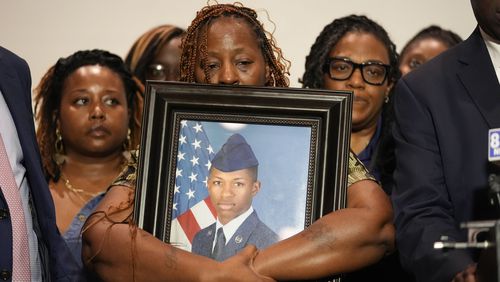ATHENS — Isabelle Philip stopped mid-sentence to hedge after describing herself as a graduating senior at the University of Georgia.
“Theoretically, if they let me graduate,” she said.
Nine students, including Philip, were arrested for criminal trespass by UGA police on Monday during a campus protest against Israel’s war in Gaza. All have been suspended from UGA, according to some of the students.
UGA has declined to confirm or to comment on student suspensions, citing the Family Educational Rights and Privacy Act, or FERPA.
But two students shared an emailed six-page letter they received Monday afternoon from the UGA Student Conduct office informing them they faced an interim suspension.
The letter cited several violations, including “reckless disruption or obstruction of teaching, research, administration or other University activities.” It provided a time — in some cases fewer than 10 minutes from when the email was sent — to contact UGA to explain why a suspension should not be levied.
Philip was released from jail around 5 p.m. Monday, roughly when the email was sent, and said she did not have access to her phone or laptop before the deadline expired.
“There was no way for me to respond,” she said.
The students, barred from campus, have the option to appeal and must schedule a meeting with Student Conduct Director Rebecca Scarbro no later than Monday. Expulsion, probation and restitution are included among sanctions in the UGA Code of Conduct for students found in violation.
Other universities have moved more slowly in arresting or suspending protesters. Columbia University waited more than 10 days before suspending student protesters who had set up tents. At Emory University’s Atlanta campus, at least one of the protesters arrested last Thursday was reassured by the dean of students that she would not face conduct charges or be barred from campus.
Gov. Brian Kemp, a UGA graduate, defended suspensions or expulsions for some protesters.
“If you’ve broken the law, if you’re damaging property, if you are assaulting especially police officers, you should have harsh penalties. Send a message, we are not going to allow Georgia to become the next Columbia University,” Kemp told reporters Wednesday in Forsyth.
UGA protesters said they didn’t do any of those things, and were just expressing their First Amendment rights.
Philip, an international affairs major and political science minor, is anxious to have her suspension overturned.
She said her family was excited to attend the May 10 undergraduate commencement — especially because she finished high school during the COVID-19 pandemic with no graduation ceremony.
“It would be really, really frustrating if that was impeded by just asking the university not to invest in genocide,” said Philip.
Some organizers of Monday’s protest, including Students for Justice in Palestine, have accused Israel of genocide and have demanded that UGA divest from Israel. Some Israel supporters have accused protesters of being antisemitic.
Israel invaded Gaza after Hamas attacked southern Israel on Oct. 7. Hamas militants killed about 1,200 people, most of them civilians, and took roughly 250 hostages. Israel has vowed to destroy Hamas and has killed more than 34,000 Palestinians in the Gaza Strip, according to the local health ministry.
UGA’s police department arrested 16 pro-Palestinian protesters, including seven people who weren’t students. It said demonstrators created an encampment “involving temporary structures and fencing” and failed to disperse.
In a statement Monday, UGA said it remains “firmly committed” to freedom of speech and expression but that it also has the right “to regulate the time, place and manner” of protests.
Philip said she won’t miss finals taking place this week — she has one take-home test remaining — and added she has “no idea” if there will be a resolution in time for her to attend commencement.
Zeena Mohamed, another student who was arrested and suspended, is less hopeful.
“I do not feel confident at all,” said Mohamed, president of UGA Students for Justice in Palestine.
A UGA international affairs major scheduled to graduate this year, Mohamed returned to campus Monday after being released from jail and spoke at a second protest. She was informed of her suspension by UGA Dean of Students Eric Atkinson and said she didn’t see the email in time to defend herself.
At an afternoon rally Monday, another female student told protesters that she also had received an email from UGA warning she would be suspended if she didn’t quickly respond to defend her actions. She said she only saw the email after the deadline had passed.
Roughly two dozen protesters gathered on UGA’s campus early Monday morning before they were told to disperse or be arrested. All of those who were arrested were released. About 100 people joined another round of protests later Monday.
About 15 people joined a campus protest on Tuesday. Roughly 40 pro-Palestinian demonstrators held a rally at the Arch entrance to UGA’s campus on Wednesday.
Mohamed says UGA is making an example of the arrested protestors and fears expulsion. She and Philip said most of the suspended students have received “pro bono” legal advice but didn’t disclose details. Mohamed said she was advised to express remorse for her actions and to apologize when she meets with UGA officials.
“It’s different for us because we don’t believe what we did was wrong,” she said. “We were peacefully protesting.”
She said the university also suspended the campus chapter of Students for Justice in Palestine.
“All of this is so minimal compared to students across the Arab world that cannot attend any university because of ongoing genocide,” she said. “If it takes me getting expelled from the university for people to see that, then I think it’s worth it.”
--AJC reporters Greg Bluestein and Matt Kempner contributed to this report.
About the Author







